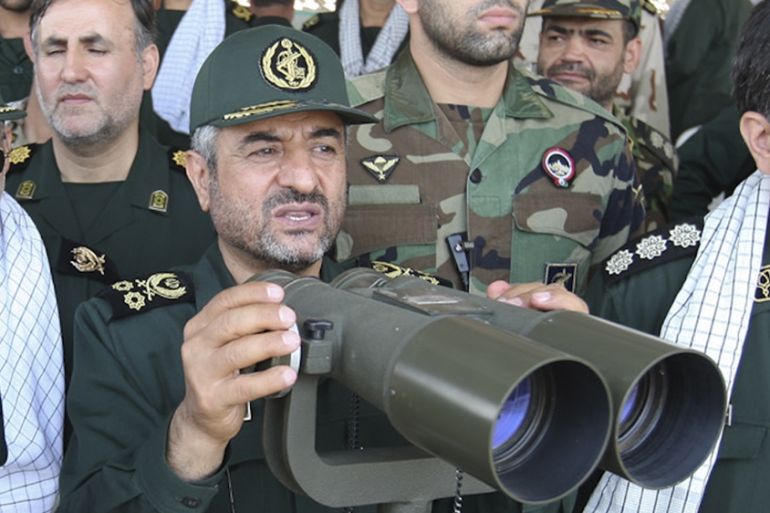Iran warns Pakistan to crack down on Jaish al-Adl
Revolutionary Guard commander says if Pakistan fails to take action at once, Iran will take its own ‘revenge’.

Iran’s Islamic Revolutionary Guard Corps (IRGC) chief has warned Pakistan to crack down on armed group Jaish al-Adl following a suicide attack in the border province of Sistan-Baluchestan that killed 27 members of the elite security force.
IRGC Commander-in-Chief Mohammad Ali Jafari said on Saturday that Islamabad should go after the armed group right away before Tehran takes its “revenge”.
Keep reading
list of 4 itemsWhat does Israel want to do after Iran’s drone and missile attacks?
Mexico to Iran, why are attacks on embassies so controversial?
US sanctions shipping firm accused of links to Iran, Yemen’s Houthis
“If Pakistan fails to punish them in the near future, Iran will do so based on international law and will retaliate against the terrorists,” Jafari was quoted by the Iranian media as saying.
|
|
His statement was in a different tone to an earlier reaction where he called on the “brotherly state of Pakistan” to tighten security along its border with Iran.
The comment comes as Saudi Arabia‘s Crown Prince Mohammed bin Salman heads to Pakistan to hold talks with Prime Minister Imran Khan and top Pakistani officials.
Jafari said Saudi Arabia and the United Arab Emirates are “conspiring” with the United States and the “Zionist regime” to foment attacks, such as Wednesday’s suicide bombing, which also left at least 13 Revolutionary Guard members injured.
“The patience that we have practised in the past towards Saudi Arabia and the UAE, who commit these actions, will change,” Jafari added.
‘A warning from Iran’
Reza Khaasteh, a Tehran-based journalist, said Jafari’s latest statement, particularly on Pakistan, is “very harsh” as it “directly blames Islamabad” for the attack.
Mohammad Farahani, the editor-in-chief of Mizan Online, however, pointed out that the statement was more of a warning than an accusation.
|
|
“He doesn’t mean Pakistan is supporting the terrorists. He has warned them to be more serious about the situation, because these terrorists are using Pakistan as a shelter. Pakistan officials must do much more to secure the border,” Farahani told Al Jazeera.
On Friday, Iranian President Hassan Rouhani told reporters that unless Pakistan did more to crack down on Jaish al-Adl, Iran will take action it “deems appropriate”.
Iran shares an almost 1,000km border with Pakistan. In the past, Tehran has been careful in addressing security issues, including deadly cross-border attacks and abductions.
“It’s not yet clear whether Iran’s response to the Wednesday attack would be an extraterritorial operation,” said Khaasteh, pointing to the recent deals between the Rouhani government and Imran Khan’s administration.
Last November, Abdelreza Rahmani-Fazli, Iran’s interior minister, had hinted that Iranian forces could launch operations against “terrorists” in Pakistani territory in case Islamabad “fails to do its part”.
History of violence
The Jaish al-Adl armed group has been launching deadly attacks against Iranian border guards since at least 2013, during which 14 Iranian forces were killed in an ambush near the border.
![Mourners pay tribute to the Revolutionary Guard members killed on Wednesday [Morteza Salehi/AP]](/wp-content/uploads/2019/02/10e6a17071d44daa8747801cb59185e8_18.jpeg)
Jaish al-Adl’s operation started after its parent group, the al-Qaeda-affiliated Jundullah, was dissolved following the capture and execution of its leader, Abdolmalek Rigi, by Iran in 2010.
According to the SITE intelligence and security tracker, Jundullah had previously claimed to receive Saudi donation from an unnamed “philanthropist”.
In one of its latest operations in October 2018, Jaish al-Adl abducted 12 Iranian security personnel near Zahedan along the Iran-Pakistan border.
In that incident, Pakistani security forces helped Iran recover at least five of the 12 abductees from the armed group.
In 2014, at least five members of the Iranian security forces were also abducted.
Khaasteh said that like the Jundullah outfit, he expects Iran to “put an end to the brutal attacks” of Jaish al-Adl.
“But that requires Pakistan’s cooperation,” he said.
|
|
Whether or not the latest attack is also a provocation on Iran by “Saudi and Emirati sponsors of Jaish al-Adl”, Khaasteh said he expects Tehran to give a “short-term response” to demonstrate to the public that it is taking action.
In response to previous attacks, Iran executed Jaish al-Adl prisoners, or launched retaliatory attacks against their positions inside Iranian territory.
Iran’s southern border region with Pakistan has seen several attacks, including a suicide car bombing in the port city of Chabahar in December, which left four police officers dead and 42 others wounded.
In September, the Revolutionary Guard said it dismantled a “terrorist cell” and killed four fighters in Saravan, another city in Sistan-Baluchestan province.
In December 2010, 41 people were killed and 90 others wounded after a suicide attack near a mosque in Chabahar.
Other recent attacks in the country’s south also include the deadly attack in Ahvaz that killed 29 people, many of them draftees of the Revolutionary Guard.